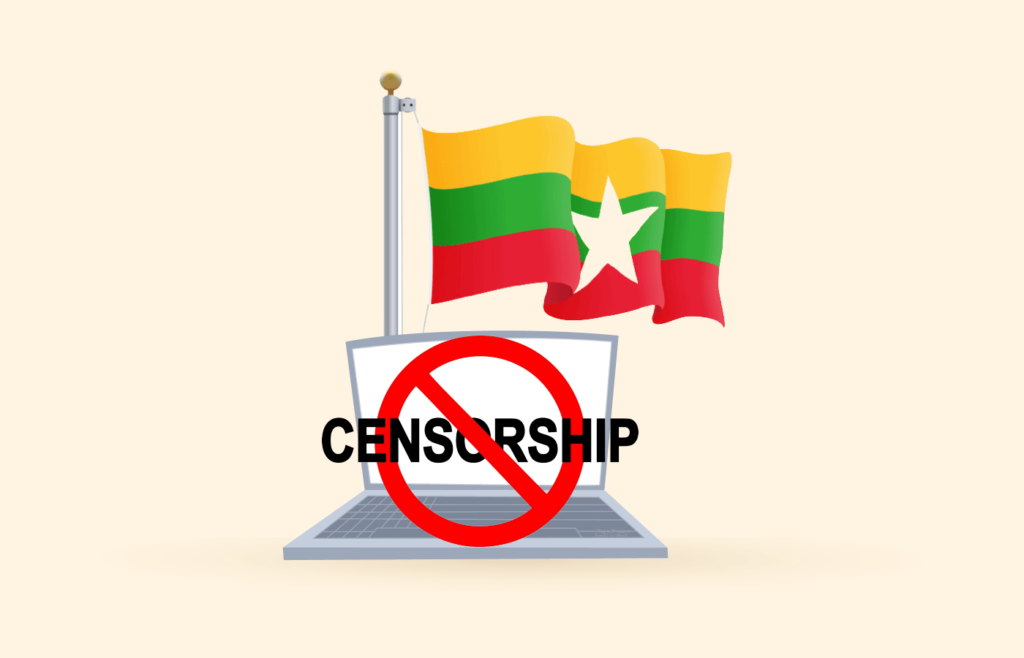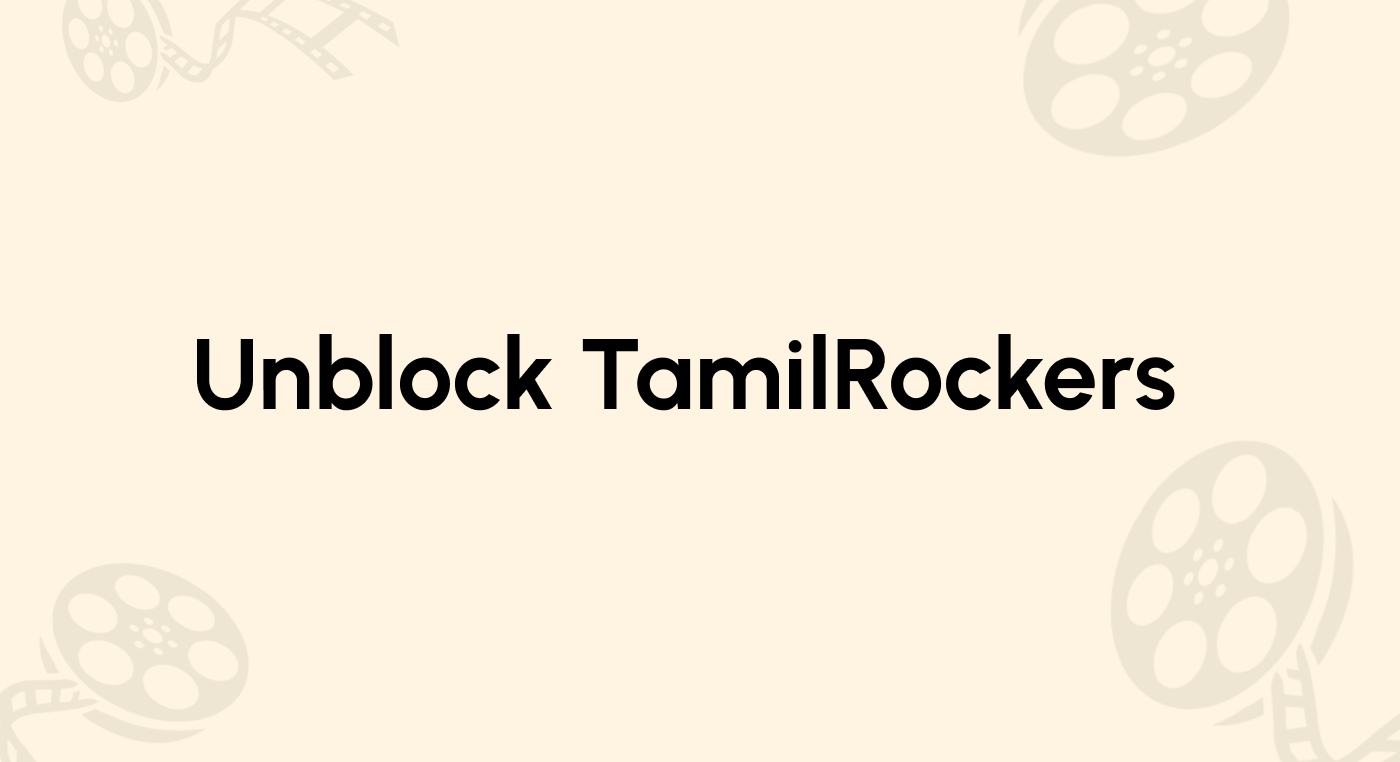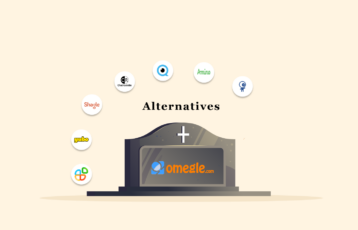Governments worldwide continue to deploy network disruptions and internet shutdowns to forestall election losses, quell mass protests, cut off conflict areas from the outside world, or reinforce military coups.
Today, Myanmar is among the most censored countries in the world. Freedom House categorizes it as ‘not free‘ with a score of 9 out of 100 on the Global Freedom Index.
Myanmar citizens can evade this censorship using a virtual private network (VPN). This essential online tool enables regular civilians, journalists, and civil society groups to protect their identities online.
In this article, we will examine the censorship situation in Myanmar and the best VPNs for evading the restrictions.
Military censorship: Limitation to Freedom of Speech
The National League for Democracy (NLD) won the November 2020 parliamentary elections, defeating the military-backed Union Solidarity and Development Party (USDP). However, the military claimed the election was fraudulent and overthrew the civilian government. They then declared an ongoing state of emergency.
A protest movement known as the Civil Disobedience Movement has been spreading since after the imprisonment of NLD leader Aung Sang Suu Kyi. Sadly, the Myanmar military junta continues to enforce strict censorship and violate human rights to respond to opposition forces.
Freedom of the press
Myanmar’s (formerly Burma) post-independence constitution grants freedom of expression, and there was relative freedom of the press in the 1950s.
There was a coup d’état in 1962. Since then, the government remained under direct or indirect military control until 2011. After that, the country enjoyed a period of liberalization between 2011 and 2021 with relatively relaxed censorship laws. However, matters became worse after the February 2021 military coup, and now the country has one of the most suppressed press freedom. The Committee to Protect Journalists claim Myanmar is among the worst jailers of journalists.
The region obliges the media to portray the military government positively, failure to attract severe punishment. Usually, journalists face public attacks, torture, imprisonment, and forcible disappearances. For example, Chan Bu, a journalist at The 74 Media group, was denied food and sleep, tortured, and even threatened with murder for not answering questions about her company. She is among the many journalists going through hardships in the country.
Internet censorship
A decade ago, only a few Myanmar residents could afford mobile phones and the internet, and most people were unaware of mobile connections. However, about 35% of the population had internet access in 2020, a complete contrast to 2011, when the penetration rate was less than 1%.
Despite the increased internet usage, the country has strict censorship legislation, and people often face prosecution. For example, during the military coup, over 86 journalists were charged for online publications between February 2021 and June 2021.
Moreover, the military has added many social media influencers, bloggers, and tech entrepreneurs to a blacklist database. In the initial stages of the coup, the military repeatedly switched off the internet to control the narrative and stop the spread of information. In particular, it blocked Facebook from stopping the organization and mobilization of protestors.
Clampdown on democratic protests
Civil society actors and human rights organizations have raised serious concerns about how the military forces handled pro-democracy protestors. It has been only a year since the coup, but the military has carried out air assaults, burned entire villages, and killed more than 1,500 people. Also, anyone who participates in the Civil Disobedience Movement faces the worst kind of physical and mental torture. Furthermore, the Tatmadaw maintains that the elections were fraudulent and cannot accept to be in the opposition.
Why does the military junta in Myanmar censor the internet?
Myanmar has a low internet penetration rate compared to other parts of the world. However, many people in the country rely on the internet to communicate with their friends and families. For example, Facebook is highly popular, with most people using it.
The military junta censors and controls the internet to suppress dissent and monitor online communications. Sadly, the country has been under military rule for many years.
There was a sigh of relief following the democratic reforms made between 2011 and 2012. For example, abolishing pre-publication censorship opened the door for independent news outlets. However, the 2021 coup reversed these liberalizing policies.
The military junta prevents the spread of pro-democratic information by oppressing political dissent. It justifies censorship by claiming to block immoral content or threats to national security.
Self-censorship
Recently, many people are opting to self-censor on online platforms due to the growing risk of imprisonment or abuse. They hide their identity online, use nicknames or acronyms for sensitive information, or communicate with encrypted messaging software.
Self-censorship existed before the coup, especially when discussing the treatment of women and minorities. However, its extent has grown significantly after the 2021 military coup.
Content facing censorship in Myanmar
Censorship is widespread and significantly affects Myanmar society. For example, many journalists had to go underground or into exile to report freely. In particular, the Electronic Transactions Law prohibits the distribution of information that may compromise state security, national culture, and law and order.
Below are some of the content considered to threaten morality and safety.
Illegal content
Despite the political instability, Myanmar generally has a conservative society. So, the country censors any drugs, alcohol, or gambling-related content. In addition, it also blocks pornography and online dating sites.
Schools in the country do not provide sex education. Article 68 indicates a punishment of three-year imprisonment for ‘sexually explicit speech.’
Sometimes, the military junta deploys explicit material to achieve a specific agenda. For example, it uses revenge porn to shame and dishonor young female activists opposing the regime. However, similar material also appears online, targeting women associated with military leaders as a countermeasure.
Myanmar also prohibits homosexuality. In addition, the state does not recognize gender identities like transgender, non-binary, etc. Additionally, LGBT community members face imprisonment for more than 20 years.
Political dissent
Any content that touches on the military authority faces thorough scrutiny. Some laws created after the coup incriminate disloyalty, disobedience, or hatred of the regime. Also, you can go to jail for spreading content deemed to propagate false news, cause fear, or agitate directly or indirectly. An amendment to the cybercriminal law compels internet service providers to remove any ‘verbal statements against any existing law.’
Independent reporting is becoming wrongdoing due to the increased surveillance and restrictive laws in Myanmar. Making matters worse, the government has the prerogative to cancel or revoke media licenses.
Tatmadaw has made it impossible for journalists to share news, footage, and information by restricting the internet. Moreover, the Ministry of Information has banned news outlets from using words such as ‘coup,’ ‘junta,’ or ‘regime’ when reporting. Similar laws also apply to foreign correspondents.
Satirical political pieces are not condoned either. For example, Peacock Generation poetry group members faced six-month imprisonment for satirizing Tatmadaw in live-streaming performances.
Information control and Big Tech censorship
The region also censors tech giants like Facebook and Google, forcing them to comply with local regulations to avoid blocking. These directions have also affected other websites, with services like YouTube and TikTok increasingly removing content on their platforms.
Moderating online content can compromise your right to free information. Yet, ironically and inevitably, algorithms of a social network like Facebook amplify the content the regime wishes to suppress.
How does Myanmar’s military government censor the internet?

Due to the ongoing unrest after the coup, the government used various censorship techniques. As a result, it becomes tough for journalists, activists, and even civilians to communicate, protest, or resist.
Telecom sector capture
The Telecommunications Department (PTD) is in charge of the telecom sector. They are responsible for managing and regulating inspection, licensing, and supervising providers.
Mobile operator Myanmar Posts and Telecommunication (MPT) manages most of the country’s telecommunications infrastructure. It is the same company that handles mobile internet service in the country.
Before the coup, the government interfered with the PTD and MDT operations. Currently, they are under the complete control of the Tatmadaw.
Furthermore, the Ministry of Transport and Communications (MoTC) compels telecom services to block content. Therefore, a lack of cooperation may lead to loss of license.
Internet restrictions
Unfortunately, the MoTC has the power to switch off the internet without prior notice or oversight. The military started to disrupt the internet shortly before the 2021 coup, and on February 1st, there was an entire mobile internet cut-off in Myanmar. Although it resumed later, there was another 30-hour shutdown six days later.
Since then, the government has shut down the internet whenever the Ministry of Transport and Communications feels a narrative becomes challenging to control.
Social media and web pages
Blocking certain websites and social media platforms is one popular censorship tool used by governments worldwide. For example, the military junta in Myanmar ordered internet service providers (ISPs) to block Facebook and its associates like Messenger and WhatsApp on February 3rd, 2021.
The government says the main reason for blocking the websites is that they contribute to instability in society. They aim to prevent the spread of fake news to avoid confusion and misunderstanding. Twitter and Instagram were also blocked on February 5th. Wikipedia was blocked later in an attempt to stop the spread of information.
Law and regulation
The Tatmadaw has been amending the cyber security laws to support censorship. However, according to legal experts, the rule of law in the country collapsed after the 2021 military coup.
In most democratic countries, the Judiciary holds the Executive arm of the government responsible. However, all constitutional bodies were immediately replaced after the junta seized power.
Amendments to the cybercrime laws after the coup placed all private data under the military’s control. Service providers are forced to collect and store data on servers accessible by military personnel.
Some of the new proposed laws have an extra-territorial reach. They introduce international offenses where Myanmar citizens can be prosecuted for felonies done outside the country. The military regime is so petty that using false names on social media sites can attract an imprisonment of 3years.
Surveillance
The Tatmadaw is increasing its surveillance of the Myanmar population. For instance, ISPs have received instructions to install spyware and provide access to private communications. As a result, the military can listen to phone calls, view private messages, and track people’s locations.
Interestingly, the government has invested millions of dollars in extraction technologies since 2018. It includes MSAB Field units used to extract deleted content from devices and MacQuisition forensics software to hack Apple products. Apparently, the government was doing biometric SIM-card registration with plans to create a database with facial-recognition information and fingerprints before the coup.
Besides, the government uses multiple techniques, like blocking pages and restricting online access, for censorship to be effective. Although the intention is to prevent citizens from seeing certain things, there is a deliberate effort to influence what they see.
Disinformation
Sometimes, the military government uses its own media outlets to spread misleading or false information when it becomes hard to control the independent media. Ironically, the government is stringent on disinformation, but it distributes false information to drive a particular agenda.
The government’s deliberate manipulation of the media has contributed to the oppression of religious minorities like Rohingya. According to a report by the United Nations, the Tatmadaw use state-controlled media to create a hate frame around minority groups. Also, they shape public opinion on social media by using military accounts to amplify the content.
The government creates and manages fake Facebook accounts to maintain power and further its pro-military narrative. They also use bot systems and troll farms for a wider reach.
Malware and hacking
Activists and journalists have reported attempts by the junta to hack their online activities and private communications. Microsoft expressed concern regarding the increasing number of malware-infected devices in Myanmar. Unfortunately, it is ranked among the countries with the most virus infections. Tatmadaw is taking advantage of the fact that malware infection and hacking are cost-effective in maintaining an authoritarian and oppressive rule.
How to bypass the censorship in Myanmar?
The government has banned many censorship-evading tools, so it is difficult for people to access the internet or even communicate privately. For example, it banned virtual private networks (VPNs) in March 2021. In addition, in some instances, the military junta has forced telecom providers to block specific IP addresses to prevent total access to the internet.
Nonetheless, people still use digital security tools to stay safe online, including VPNs.
Use a VPN
Since the coup, the demand for VPNs in Myanmar has increased by more than 7000%. So therefore, choose a VPN service with top-notch encryption and features such as obfuscation because Myanmar’s military surveillance is stringent.
Free VPNs can lure you with enticing deals, but you should be very careful or avoid them altogether. That’s because most of them have poor security features, and your data can fall into the wrong hands. Also, you can be in trouble if the government notices that you are bypassing its censorship.
Will a VPN keep you completely private online?
A VPN will improve your online privacy but cannot guarantee complete anonymity. It works by creating an encrypted tunnel between your device and the server to safeguard your data. Also, you will receive a new IP address that will enable you to bypass censorship and restrictions. However, remember that the side between the VPN server and the website remains unencrypted.
The reason for the VPNs’ increased popularity is that they make it virtually impossible to track users’ online activities. However, this does not mean you will have complete anonymity as you will be leaving digital fingerprints everywhere as you browse the internet.
Malicious actors with a bit of technical expertise can still trace your identity. So, a VPN helps to improve your online privacy but does not make you invisible. The best survival tip is to avoid leaving personal information carelessly online.
How to use a VPN in Myanmar
- Choose any of the VPNs we have reviewed below. Our number one choice is NordVPN.
- Select the appropriate package and subscribe.
- Download and install the software.
- Launch the VPN and connect to a server of your choice.
Is it illegal to use a VPN in Myanmar?
Myanmar is among the few countries that have outlawed VPN usage. Unfortunately, you can get into trouble if found using one, so you should be aware of the risks. Recently, the military junta was planning to adopt a law that could permit the imprisonment of anyone using a VPN.
Some VPNs come with an obfuscation feature that makes it impossible to see VPN traffic. This feature is good for people living in places where VPNs are illegal. The Myanmar police even confiscate people’s phones on the streets to check for VPNs installations.
Best VPNs for Myanmar today
Remember that using a VPN in Myanmar may lead to your arrest. Therefore, you should only choose a VPN service with solid encryption and extra measures to protect your connections. The most crucial features to consider when choosing a VPN for Myanmar include:
- Reliable security – The VPN should have 256-bit AES encryption, a kill switch, DNS/IPv6 leak protection, and a dependable VPN protocol like OpenVPN. In addition, multi-server connections and obfuscation features are a bonus due to the strict regulations in Myanmar.
- Zero-logging policy – It is crucial to choose a VPN provider with a strict no-logs policy because of the heightened surveillance in Myanmar.
- Anonymity – A good VPN for Myanmar should have an option to sign up and subscribe anonymously. It means signing up via a fake email address and paying with an anonymous method like cryptocurrency.
Considering these parameters, below we list the top five VPNs that can evade internet censorship in Myanmar.
1. NordVPN

Another ideal Myanmar VPN, thanks to its obfuscated servers that hide the fact a user is using a VPN, which benefits significantly in restrictive environments.
Pros
- Strong encryption
- Does not collect logs
- Reliable customer support
Cons
- The desktop app falls a bit short compared to other top VPNs
NordVPN is another trustworthy VPN service to circumvent censorship and surveillance in Myanmar. It has existed for more than a decade and continues to improve its service. The VPN is famous for its privacy consciousness and solid security.
Myanmar ISPs will not be able to access your data because NordVPN uses AES 256-bit encryption. It is a high-level algorithm that is almost impossible to crack or intercept. It also has a kill switch that will cut your traffic if the VPN connection fails to prevent your data from leaking.
Additional security features include perfect forward secrecy that will change the encryption keys every time you launch the VPN. Also, it has multiple protocols, DNS/IP leak protection, split tunneling, double VPN, and onion over VPN.
The company has a strict zero-logs policy and refrains from collecting private data like IP addresses, sessions, traffic, or timestamps. Also, it is headquartered in Panama, a privacy-friendly region that does not force companies to retain user data.
NordVPN’s network is relatively extensive, with more than 6,800 servers in 113 countries, making it a great choice to evade geo-restrictions. Although it does not have servers inside Myanmar, there are plenty of options in the Southeast Asia region.
The VPN offers user-friendly apps. Also, it supports all major operating systems, including macOS, Windows, Linux, iOS, and Android. Additionally, it comes with a 30-day money-back guarantee, so you can test it risk-free.
2. ExpressVPN

It lets you enjoy unrestricted browsing and unlimited streaming in Myanmar, thanks to its exclusive SmartPlay technology and unlimited bandwidth.
Pros
- Best-in-class privacy and security features
- Super-fast servers
- Does not collect identifiable information
Cons
- Slightly expensive plans
ExpressVPN has continuously emerged as a frontrunner in our recent VPN tests. On top of that, it has a reputation for reliability and outstanding speeds. In addition, its apps are user-friendly, which is a good thing for new VPN users.
It uses the standard AES 256-bit encryption to protect online connections. There is also perfect forward secrecy that changes the encryption keys frequently to prevent security compromises. In addition, the company has an automatic kill switch (Network Lock) that stops data from leaking if the VPN connection fails.
Another crucial security feature is the protocol, a set of rules that a VPN uses to encrypt your information. ExpressVPN offers multiple options like OpenVPN, Lightway, IKEv2, and L2TP/IPsec. Thankfully, you can easily switch to any choice in the protocol tabs.
Although the privacy policy is lengthy, the company explicitly states that it does not collect personally identifying data. However, it gathers diagnostic and maintenance-related data, which cannot help trace your identity or location. The best part is that ExpressVPN is based in the British Virgin Islands, a privacy-friendly country.
It has a relatively extensive infrastructure with servers spread across 160 locations in over 105 countries. These are some of the fastest VPN services in the industry. Fortunately, the company operates a server in Myanmar that will give you a Myanmar IP address to unblock local content from abroad. But, of course, you can get IP addresses from other locations worldwide to evade censorship and surveillance in the country.
3. Private Internet Access (PIA)

It is a super-secure VPN service that you can trust to unblock sites in Myanmar without any log-keeping or other privacy issues.
Pros
- A verified no-logs policy
- Formidable security
- Massive server network
Cons
- Inconsistent speeds on some servers
As the name suggests, Private Internet Access (PIA) is a secure VPN service that bypasses restrictions and censorship. It has one of the industry’s most extensive server infrastructures, although some are proxies.
The VPN deploys AES 128-bit encryption by default, but you can raise it to 256-bit encryption. Both are reliable algorithms, but the latter is more secure. Like other VPNs on this list, it has an effective kill switch to ensure your data is safe even when the VPN connection drops. Also, it has leak protection for DNS, WeRTC, and IP addresses.
PIA has a split tunneling feature that will enable you to reroute part of your traffic via a VPN server and the rest through a regular connection. So, for example, you can use your banking app outside the VPN to avoid account blocking when changing the IP address.
The MACE ad blocker will prevent ads from interfering with your internet experience. It also blocks trackers and malware that can compromise your security and privacy.
Private Internet Access does not retain any information that can reveal your identity online. Instead, the company only stores payment details, email addresses, and other anonymized data for diagnostic purposes. Thankfully, you can even create an account with a fake email address and pay with cryptocurrencies.
4. Surfshark

It’s an exceptionally budget-friendly VPN. But it is a real deal in terms of security, speed, and unblocking capabilities – perfect for internet users in Myanmar.
Pros
- Intuitive desktop and mobile apps
- Affordable packages
- Helpful privacy features
Cons
- Some servers have slow speeds
Surfshark is the best value-for-money VPN to evade internet censorship by the Myanmar government. It has a decent-sized server network and supports unlimited simultaneous connections on a single subscription.
The VPN uses military-grade AES 256-bit encryption to prevent the military government from seeing what you are doing online. It combines the algorithm with 2048-bit DHE RSA key exchange, SHA512 authentication, and perfect forward secrecy. It means you can access any censored or restricted content anonymously.
Surfshark also offers a kill switch that you can enable and disable within apps. In addition, the provider has made the feature easily accessible from the connection screen.
MultiHop servers also add an extra encryption layer by routing your traffic through a second VPN server. Other VPNs like NordVPN call it double VPN. Although the process reduces speed, it is helpful to journalists and activists in places like Myanmar because of its pervasive censorship and surveillance.
Another reason why Surfshark is a good option for Myanmar is the Camouflage Mode. Also known as an obfuscation feature, it will hide the fact that you can encrypt your traffic and evade censorship with a VPN. Thus, it acts as a double-edged sword, blinding the Myanmar government or ISP to your online activities and VPN usage.
5. CyberGhost

It has been in the VPN sector for years now, which speaks of its quality on its own. A great pick for beginners looking to protect their online privacy in Myanmar.
Pros
- Robust security and privacy
- User-friendly apps
- Extensive money-back guarantee
Cons
- We found some WebRTC leaks on macOS
CyberGhost has been in the VPN game for many years and has perfected the art of protecting your online security and privacy. In addition, its apps are easy to use, so it is an excellent choice for beginners.
The provider may not be operating servers in Myanmar, but it is still a good option for evading censorship. Unfortunately, it does have an obfuscation feature, unlike Surfshark and NordVPN, so your ISP can see you are using a VPN.
CyberGhost operates over 8,000 servers in 91 countries, the second biggest network on this list. An extensive server infrastructure decreases the risk of congestion because there is sufficient space to hold many users simultaneously.
The VPN is incredibly safe as it uses AES 256-bit encryption with perfect forward secrecy, SHA256 authentication, and 2048-bit RSA keys. In addition, it has an automatic kill switch that will come in handy if the VPN connection malfunctions. Also, all its apps prevent DNS/IPv6 and WebRTC leaks, so you will always remain anonymous.
Most VPNs offer a money-back guarantee of 30 days. However, CyberGhost gives you a whopping 45 days before deciding whether to stick with the product or ask for a refund.
Other tools to evade internet censorship in Myanmar
People in Myanmar are looking for alternative ways to circumvent internet censorship by the Myanmar government and protect their online privacy.
One such workaround that has gained popularity is the use of encrypted communication apps. For example, the Bridgify app exhibited over one million downloads in a few days preceding the coup.
Secure browsers are another excellent option for circumventing censorship. Even though it is an anonymity tool, Tor Browser is one such browser that you can use to circumvent network censorship. Tor makes it difficult for third parties, including authorities, to track users’ web traffic and communications by distributing online activities and searches between a network of servers worldwide.
Moreover, a free proxy service known as Psiphon reached over 1.6 million users after the coup. The parent company is based in Canada and receives financial support from the US government. It mainly attracts people in oppressive regimes like China and Iran to evade censorship and restrictions.
Fortunately, Psiphon is open-source censorship circumventing tool that you can easily download from Apple Store and Google Play Store. Canadian university researchers developed it to help people avoid internet firewalls.
FAQs
Myanmar witnessed a spike in VPN users since the military seized power in February 2021. VPN usage rose to over 7000% during the coup as people tried to protect their online privacy. So, using a VPN in Myanmar is essential to bypass censorship and safeguard privacy.
The Myanmar government can close the internet at any time. For instance, they have done it severally, sometimes for several days, since the military overthrew the democratic government. Remember that you can’t access apps and websites that the government doesn’t want you to see due to extensive internet censorship.
Yes, there are several ways you can evade censorship in this country. However, due to the increased government surveillance and punishments, you need to remain highly cautious. Some of the things you can do include installing a premium VPN, avoiding sharing personal information, and using encrypted messaging apps.
During our tests, ExpressVPN trounced the rest, especially regarding speed. Also, its high-quality servers will help you evade internet restrictions and surveillance. However, keep in mind that VPNs are banned in the country, so be cautious when using one.
The government censors and forces service providers to block any content deemed immoral or a threat to security. It includes gambling, pornography, drugs or alcohol, or political dissent.



